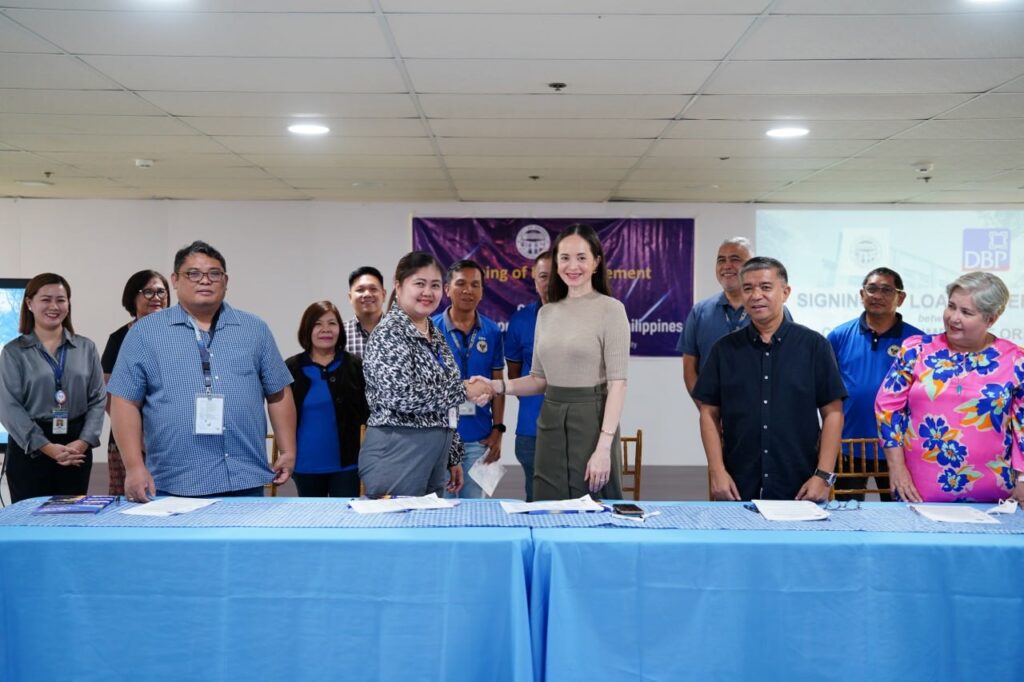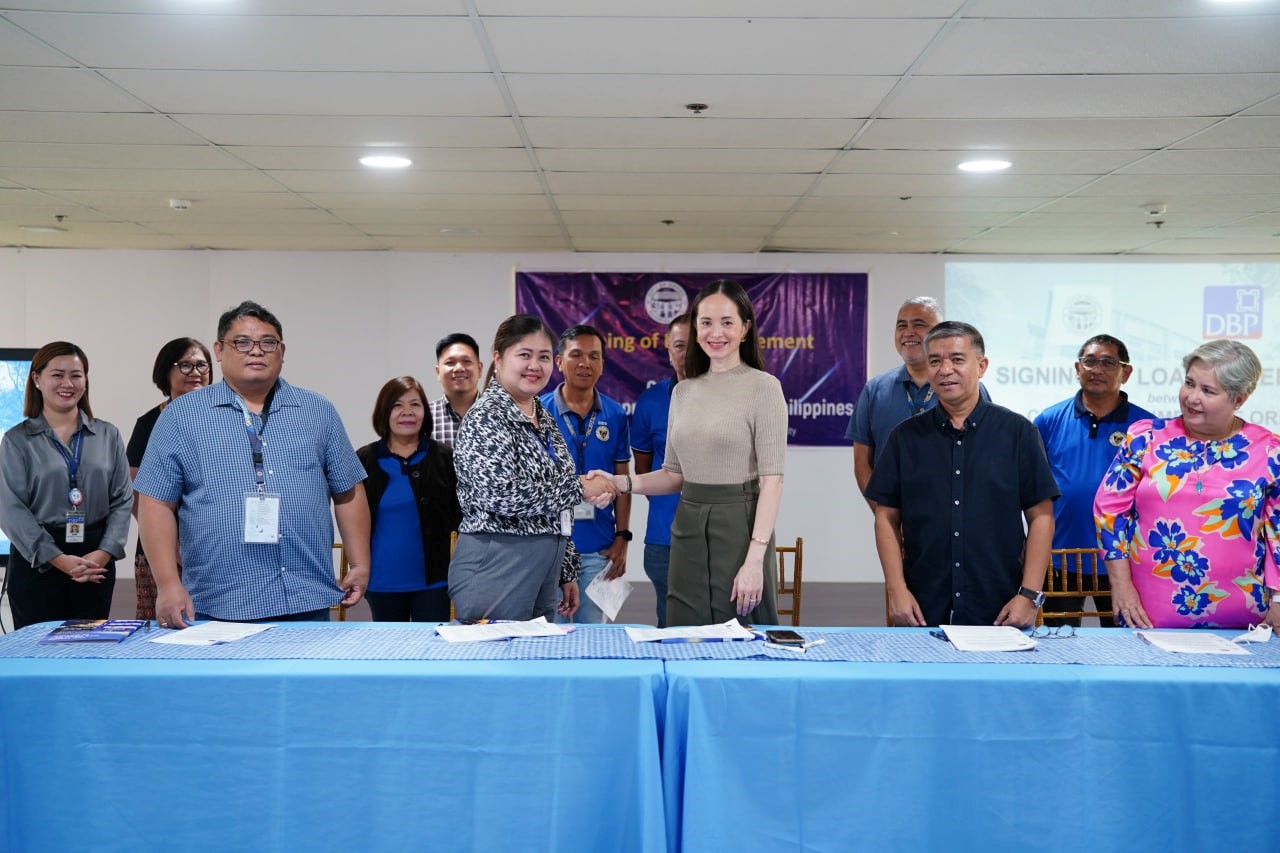A senior official of the state-owned Development Bank of the Philippines (DBP) announced recently that it had approved a groundbreaking P300-million loan to finance the City Government of Ormoc’s site and land development, supporting President Ferdinand R. Marcos, Jr.’s flagship national shelter program.

Ormoc City Mayor Lucy Marie Torres-Gomez (center) shakes hands with Atty. Janet L. Dacillo, DBP Tacloban Lending Center Head, during the P300-million loan agreement signing. Joining them are executives of the Department of Human Settlements and Urban Development, Ormoc City LGU, and other DBP officials.
DBP President and Chief Executive Officer Michael O. de Jesus revealed that this financing assistance marks the first approval under the bank’s credit facility for the Pambansang Pabahay Para sa Pilipino (BAHAY-4PH) program.
As part of the bank’s renewed interest in financing critical public infrastructure projects in the country to optimize the mobilization of fresh funds it acquired from its latest local bond issuance, this new lending initiative is also designed to bolster priority housing projects spearheaded by the current administration.
DBP’s collaboration a timely response
As the tenth largest bank in the Philippines by assets, DBP provides crucial credit support across four priority sectors of the economy: infrastructure and logistics, micro, small and medium enterprises, the environment, and social services and community development.
“DBP’s collaboration with Ormoc City is a timely response to President Marcos Jr.’s call to ensure affordable housing for all Filipinos,” said de Jesus in a press release.
He elaborated that the loan will finance the construction of two four-story buildings, each comprising 96 housing units.
These units are expected to benefit qualified low-income families and residents currently living on government-owned properties.
De Jesus further emphasized that DBP’s support for emerging cities like Ormoc is essential to achieving the Marcos administration’s goals of alleviating poverty, providing decent and affordable housing to eligible beneficiaries, and ultimately reducing the number of informal settlers to zero by 2028.
“Through the BAHAY-4PH Program, DBP aims to strengthen the national government’s efforts to meet the national housing target of 6.5 million units from 2022 to 2028, fostering inclusive, safe, resilient, and sustainable human settlements across the country,” de Jesus added.
The BAHAY-4PH initiative is a sub-program of the DBP’s Building Affordable Homes Accessible to Every Filipino (BAHAY) Program, serving as the Bank’s main credit facility for the housing sector.
It is designed to fund site development, housing construction, and land acquisition for local government units, developers, contractors, and joint venture entities involved in the 4PH program.
Resilience in the face of natural disasters
Ormoc City, a thriving hub of agro-commercial, industrial, and tourism activities in Eastern Visayas, is home to over 230,000 residents. Despite its bustling economy, the city has faced significant natural disasters that have tested its resilience.
In 2013, Super Typhoon Yolanda (international name Haiyan), one of the strongest typhoons to ever hit the Philippines, wreaked havoc across Eastern Visayas, claiming over 6,000 lives. Ormoc City was among the hardest hit, with power and communication lines cut off and roads rendered impassable, leaving the city isolated from the rest of the country.
This disaster echoed the devastation of 1991 when Typhoon Uring (international name Thelma) struck Leyte. The resulting flash floods killed at least 4,000 people and left thousands more injured or missing. In just 15 minutes, floodwaters rose by seven feet, burying the city under sediment and debris.
According to a report by the Manila Observatory’s Environmental Research Division, the catastrophic flooding was caused by intense rainfall, illegal logging, deforestation, and geographic conditions that made the Ormoc watershed particularly prone to erosion. Additionally, poor infrastructure and a densely populated high-risk area like Isla Verde exacerbated the disaster.
In response to these tragedies, the Ormoc city government took significant steps to enhance disaster resilience. They initiated reforestation projects and partnered with the Japan International Cooperation Agency to conduct flood mitigation studies and projects. These efforts included constructing bridges, slit dams to reduce landslides, and improving river drainage systems.
These initiatives proved effective, as evidenced by the reduced casualties during Typhoon Yolanda in 2013. The city’s strengthened disaster resilience and infrastructure improvements have significantly enhanced its ability to withstand future natural calamities, showcasing Ormoc City as a model of resilience and proactive disaster management.
About DBP
DBP is committed to enhancing economic development in the Philippines by providing strategic financing to critical sectors. As a key player in the banking industry, DBP’s initiatives, such as the BAHAY-4PH Program, underscore its mission to support national growth and development through sustainable and inclusive financial solutions.
For more information on DBP and its programs, visit www.dbp.ph.








